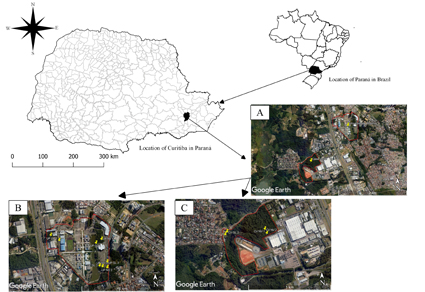Abstract
Urban green areas can have a high impact on soil fauna due the environmental changes caused by human activities. This work aimed to assess earthworm populations in urban sites in the city of Curitiba, Paraná, Brazil. Earthworms were sampled in two urban sites: the Campus Ecoville of the Universidade Positivo and the Casa Verde space and in two land use systems (Grass Lawn and Native Vegetation), in the summer of 2018 and 2019 and winter of 2019. A total of 1052 individuals were found, belonging to five families and 12 species were identified, of which five are native: Glossoscolex sp.55, Fimoscolex sp.36, Fimoscolex sp.37 (Glossoscolecidae), Andiorrhinus duseni (Rhinodrilidae) and Ocnerodrilidae sp.43 (Ocnerodrilidae) and seven are exotic species: Amynthas corticis, Amynthas morrisi, Metaphire californica, Metaphire schmardae (Megascolecidae), Dendrodrilus rubidus (Lumbricidae) and Pontoscolex corethrurus (Rhinodrilidae). Of the five native species found, four are new species and will be described in the future and the specie A. duseni belongs to the group known as giant earthworms (minhocuçu) with specimens larger than 30cm. Despite the predominance of exotic species (n=932) compared to native species (n=114), the presence of new species may indicate that the managed environments can preserve native species. Moreover, the difference in the total number (native vs. exotic) can be attributed to the ability of the exotic species to survive human disturbances.
References
Bartz, M.L.C., James, S.W., Pasini, A. & Brown, G.G. (2012) New species of Glossoscolex and Fimoscolex (Clitellata: Glossoscolecidae) from Northern, Paraná, Brazil. Zootaxa, 3458, 59–85.
https://doi.org/10.11646/zootaxa.3458.1.3
Bartz, M.L.C., Pasini, A. & Brown, G.G. (2013) Earthworms as soil quality indicators in Brazilian No-Tillage Systems. Applied Soil Ecology, 69, 39–48. https://doi.org/10.1016/j.apsoil.2013.01.011
Brown, G.G., Benito, N.P., Pasini, A., Sautter, K.D., Guimarães, M.F. & Torres, E. (2003) No-tillage greatly increases earthworm populations in Paraná state, Brazil. Pedobiologia, 47, 764–771.
https://doi.org/10.1078/0031-4056-00256
Brown, G.G., James, S.W., Pasini, A., Nunes, D.H., Benito, N.P., Martins, P.T. & Sautter, K.D. (2006) Exotic, peregrine, and invasive earthworms in Brazil: Diversity, distribution, and effects on soils and plants. Caribbean Journal of Science, 42, 339–358.
Brown, G.G. & James, S.W. (2007) Ecologia, biodiversidade e biogeografia das minhocas no Brasil. In: Brown, G.G. & Fragoso, C. (Eds.), Minhocas na América Latina: Biodiversidade e ecologia. Embrapa Soja, Londrina, pp. 297–381.
Brown, G.G (2008) Avaliação das populações de minhocas (Annelida: Oligochaeta) em sistemas agrícolas e naturais, e seu potencial como bioindicadoras ambientais. In: Saraiva O.F. & Leite R.M.V.B.C. (Eds.), Resultados de Pesquisa da Embrapa Soja 2005. Londrina: Embrapa Soja, 17–38.
Chang, C.H., Bartz, M.L.C., Brown, G.G., Callaham Jr, M.A., Cameron, E.K., Dávalos, A., Dobson, A., Görres, J.H., Herrick, B.M., Ikeda, H., James, S.W., Johnston, M.R., McCay, T.S., McHugh, D., Minamiya, Y., Nouri-Aiin, M., Novo, M., Ortiz-Pachar, J., Pinder, R.A., Ransom, T., Richardson, J.B., Snyder, B.A. & Szlavecz, K. (2021) The second wave of earthworm invasions in North America: biology, environmental impacts, management and control of invasive jumping worms. Biological Invasions, 1–32.
https://doi.org/10.1007/s10530-021-02598-1
Demetrio, W.C., Santos, A., Ferreira, T., Nadolny, H., Cardoso, G.B.X., Torres, J.L., Da Silva, E.S., Brown, G.G. & Bartz, M.L.C. (2018) Earthworm species in various land use systems in the Campos Gerais region of Lapa, Paraná, Brazil. Zootaxa, 4496, 503–516. https://doi.org/10.11646/zootaxa.4496.1.39
Ferreira, T., Santos, A., Demetrio, W.C., Cardoso, G.B.X., Moraes, R., Assis, O., Niva, C.C., Smokanit, M., Knópik, J., Sautter, K.D., Brown, G.G. & Bartz, M.L.C. (2018) Earthworm species in public parks in Curitiba, Paraná, Brazil. Zootaxa, 4496, 535–547. https://doi.org/10.11646/zootaxa.4496.1.41
Grise, M.M., Biondi, D. & Araki, H. (2017) A floresta urbana da cidade de Curitiba-PR. Floresta, 46, 425–438. https://doi.org/10.5380/rf.v46i4.42212
Köppen W. Climatologia. México, Fundo de Cultura Econômica. 1931.
Korasaki V., Morais, J.W., Braga, R.F. (2013) Macrofauna. In: Moreira, F.M.S., Cares, J.E., Zanetti, R. & Stürmer, S.L. (Eds.), O ecossistema solo: componentes, relações ecológicas e efeitos na produção vegetal, pp.119–38
Lavelle, P. & Spain, A.V. (2001) Soil ecology. Springer Science & Business Media https://doi.org/10.1007/978-94-017-5279-4
Michaelsen, W. (1918) Die Lumbriciden. Zoologische Jahrbücher, Abteilung für Systematik, 41, 1–398.
Patucci, N.N., Oliveira Filho, L.C.L., Oliveira, D. de Baretta, D., Bartz, M.L.C. & Brescovit, A.D. (2017) Inventário de fauna edáfica como instrumento na avaliação de qualidade e biodiversidade de solos urbanos: estudo de caso do parque CienTec. Boletim Paulista de Geografia, 96, 66–90.
Ressetti, R.R. (2006) Densidade populacional, biomassa e espécies de minhocas em ecossistemas de áreas urbanas. Scientia Agraria, 7, 61–66. https://doi.org/10.5380/rsa.v7i1.7273
Santos, A., Gorte, T., Demetrio, W., Ferreira, T., Nadolny, H., Cardoso, G., Tonetti, C., Ralisch, R., Pit Nunes, A., Coqueiro, A., Leandro, H., Wandscheerm C., Bortoluzzi, J., Brown, G.G. & Bartz, M.L.C. (2018) Earthworm species in no-tillage agroecosystems and native Atlantic forests in Western Paraná, Brazil. Zootaxa, 4496, 517–534. https://doi.org/10.11646/zootaxa.4496.1.40
Sistema de Informações Hidrológicas – SIH (2022) Instituto das Águas do Paraná – Alturas de precipitação, resumo anual. Available from: http://www.sih-web.aguasparana.pr.gov.br/sih.web/gerarRelatorioAlturasAnuaisPrecipitacao.do?action=carregarInterfaceInicial (Accessed 1 January 2022)
Silva, E., Lima, O.G., Andrade, D.P. & Brown, G.G. (2019) Earthworm populations in forestry plantations (Araucaria angustifolia, Pinus elliottii) and Native Atlantic Forest in Southern Brazil compared using two sampling methods. Pedobiologia. 72, 1–7. https://doi.org/10.1016/j.pedobi.2018.10.002
Steffen, G.P.K. (2012) Diversidade de minhocas e sua relação com ecossistemas naturais e alterados no Estado do Rio Grande do Sul. Tese de Doutorado, Universidade Federal de Santa Maria.


